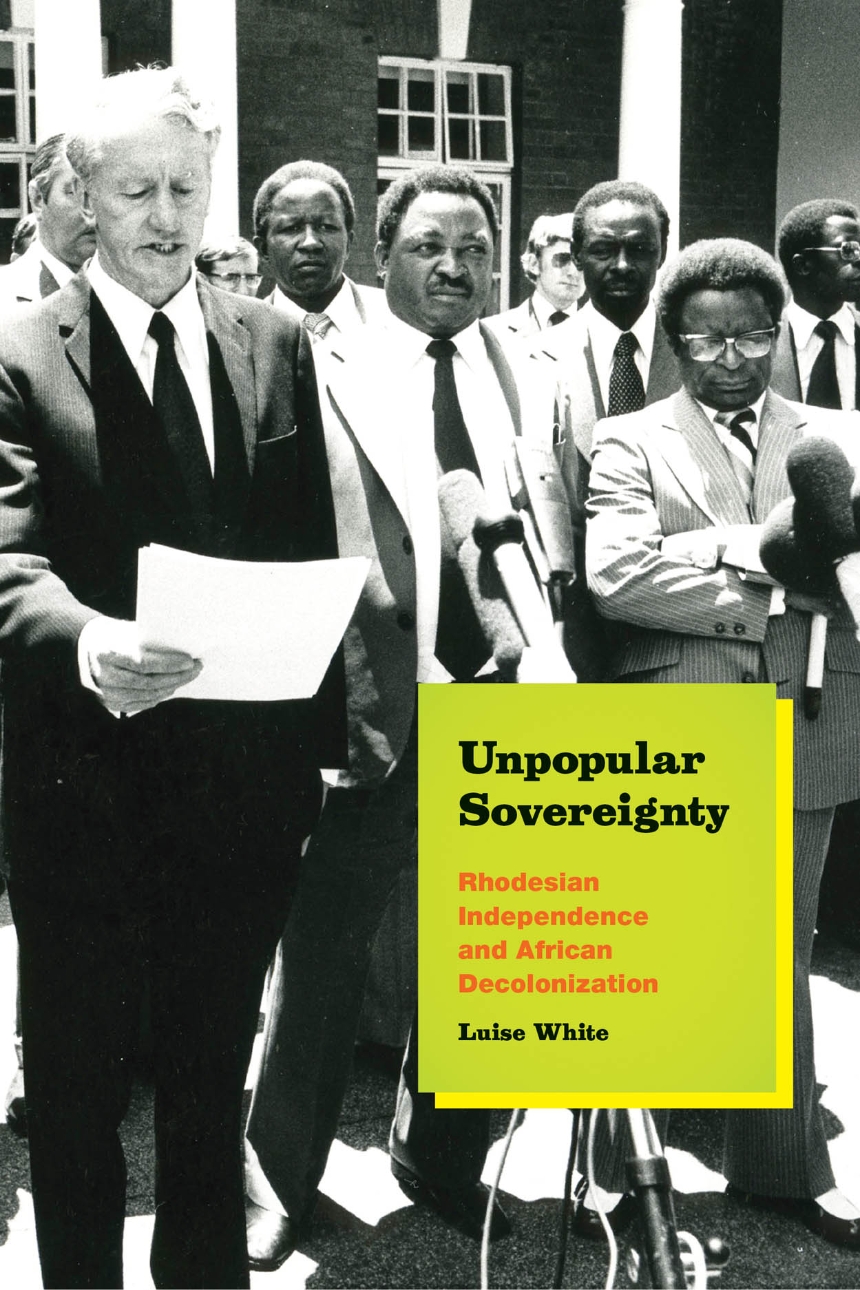Unpopular Sovereignty
Rhodesian Independence and African Decolonization
9780226235196
9780226235059
9780226235226
Unpopular Sovereignty
Rhodesian Independence and African Decolonization
In 1965 the white minority government of Rhodesia (after 1980 Zimbabwe) issued a unilateral declaration of independence from Britain, rather than negotiate a transition to majority rule. In doing so, Rhodesia became the exception, if not anathema, to the policies and practices of the end of empire. In Unpopular Sovereignty, Luise White shows that the exception that was Rhodesian independence did not, in fact, make the state that different from new nations elsewhere in Africa: indeed, this history of Rhodesian political practices reveals some of the commonalities of mid-twentieth-century thinking about place and race and how much government should link the two.
White locates Rhodesia’s independence in the era of decolonization in Africa, a time of great intellectual ferment in ideas about race, citizenship, and freedom. She shows that racists and reactionaries were just as concerned with questions of sovereignty and legitimacy as African nationalists were and took special care to design voter qualifications that could preserve their version of legal statecraft. Examining how the Rhodesian state managed its own governance and electoral politics, she casts an oblique and revealing light by which to rethink the narratives of decolonization.
White locates Rhodesia’s independence in the era of decolonization in Africa, a time of great intellectual ferment in ideas about race, citizenship, and freedom. She shows that racists and reactionaries were just as concerned with questions of sovereignty and legitimacy as African nationalists were and took special care to design voter qualifications that could preserve their version of legal statecraft. Examining how the Rhodesian state managed its own governance and electoral politics, she casts an oblique and revealing light by which to rethink the narratives of decolonization.
368 pages | 5 halftones | 6 x 9 | © 2015
History: African History
Law and Legal Studies: Law and Society
Reviews
Table of Contents
Acknowledgments
A Note on Sources
Place Names, Party Names, and Currency
1 “The last good white man left”: Rhodesia, Rhonasia, and the Decolonization of British Africa
2 “Racial representation of the worst type”: The 1957 Franchise Commission, Citizenship, and the Problem of Polygyny
3 “European opinion and African capacities”: The Life and Times of the 1961 Constitution
4 “A rebellion by a population the size of Portsmouth”: The Status of Rhodesia’s Independence, 1965–1969
5 “A James Bond would be truly at home”: Sanctions and Sanctions Busters
6 “Politics as we know the term”: Tribes, Chiefs, and the 1969 Constitution
7 “Other peoples’ sons”: Conscription, Citizenship, and Families, 1970–1980
8 “Why come now and ask us for our opinion?”: The 1972 Pearce Commission and the African National Council
9 “Your vote means peace”: The Making and the Unmaking of the Internal Settlement, 1975–1979
10 “Lancaster House was redundant”: Constitutions, Citizens, and the Frontline Presidents
11 “Adequate and acceptable”: The 1980 Election and the Idea of Decolonization
12 “People such as ourselves”: Rhodesia, Rhonasia, and the History of Zimbabwe
Bibliography
Index
A Note on Sources
Place Names, Party Names, and Currency
1 “The last good white man left”: Rhodesia, Rhonasia, and the Decolonization of British Africa
2 “Racial representation of the worst type”: The 1957 Franchise Commission, Citizenship, and the Problem of Polygyny
3 “European opinion and African capacities”: The Life and Times of the 1961 Constitution
4 “A rebellion by a population the size of Portsmouth”: The Status of Rhodesia’s Independence, 1965–1969
5 “A James Bond would be truly at home”: Sanctions and Sanctions Busters
6 “Politics as we know the term”: Tribes, Chiefs, and the 1969 Constitution
7 “Other peoples’ sons”: Conscription, Citizenship, and Families, 1970–1980
8 “Why come now and ask us for our opinion?”: The 1972 Pearce Commission and the African National Council
9 “Your vote means peace”: The Making and the Unmaking of the Internal Settlement, 1975–1979
10 “Lancaster House was redundant”: Constitutions, Citizens, and the Frontline Presidents
11 “Adequate and acceptable”: The 1980 Election and the Idea of Decolonization
12 “People such as ourselves”: Rhodesia, Rhonasia, and the History of Zimbabwe
Bibliography
Index
